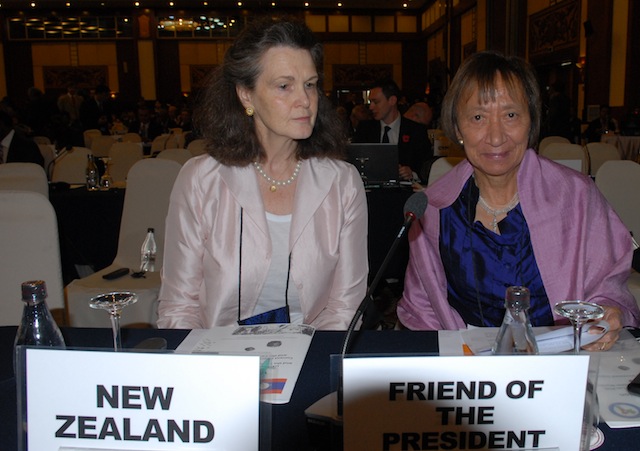(24 May 2012) What better day to begin this blog on humanitarian disarmament than the International Women’s Day for Disarmament, a day started in Europe in the early 1980s as hundreds of thousands of women organized against nuclear weapons and the arms race. Let’s look at women who have contributed to peace and disarmament…
Starting at the top, a number of United Nations officials work to advance humanitarian disarmament, including UN Women Director Michelle Bachelet, UN Disarmament Representative Angela Kane, UN Mine Action Service Director Agnes Marcaillou, and UNDP Administrator Helen Clark. In several countries, women officials are in charge of policy on humanitarian disarmament issues.
Women form the minority when it comes to disarmament diplomacy, however. For example, women accounted for 116 of 580 delegates participants at a recent PrepCom for the Arms Trade Treaty, or 20% of the total. Two countries–Mongolia and New Zealand–were comprised of an all-women delegation. By comparison, women accounted for more than half (53%) of the civil society delegation that observed the meeting.
This research came from the Reaching Critical Will website, which many disarmament diplomats and campaigners refer to on a daily basis. The site is run by the Women’s International League for Peace and Freedom (WILPF), which may be the oldest women’s peace organization in the world (established 1915), but it remains among the most active in the field of humanitarian disarmament and one of the most savvy technologically. We commend their work.
WILPF leaders Jane Addams and Emily Greene Balch were among the first women to receive the Nobel Peace Prize in 1931 and 1946, respectively. Yet there has been scant recognition of the role played by women in advancing peace and disarmament. Of the 101 individuals that have won the Nobel Peace Prize since it was first awarded in 1901, just 15 have been women, including three in 2011.
The Nobel Women’s Initiative was established in 2006 by six sister laureates, including Jody Williams, who received the Nobel Peace Prize in 1997 together with the International Campaign to Ban Landmines (ICBL) for their role in bringing about the Mine Ban Treaty. This month, the Nobel Women’s Initiative and other non-governmental organizations launched the International Campaign to Stop Rape & Gender Violence in Conflict. The campaign demands urgent and bold political leadership to prevent rape in conflict, to protect civilians and rape survivors, and calls for justice for all.
Let’s complete this round-up by remembering New Zealand’s last Minister for Disarmament and Arms Control, Hon. Georgina te Heuheu, who made several contributions to humanitarian disarmament, from overseeing New Zealand’s swift ratification of the Convention on Cluster Munitions to ensuring that more women and indigenous persons became expert members of the Public Advisory Committee on Disarmament and Arms Control (PACDAC). The New Zealand government terminated the Minister for Disarmament position in December 2011 and transferred its responsibilities to Minister of Foreign Affairs, Hon. Murray McCully.
Many talented and dedicated women and men work daily to advance the humanitarian disarmament agenda. Most do so without acknowledgment or recognition and often for low or no pay. We salute everyone’s efforts on this International Women’s Day for Disarmament.
Photo: New Zealand’s Disarmament Ambassador Dell Higgie and Minister for Disarmament and Arms Control Hon. Georgina te Heuheu, Vientiane, November 2010


Leave a Reply